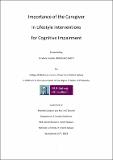| dc.description.abstract | Lifestyle risk factors have been identified as key targets for dementia prevention strategies, with most clinical trials targeting individual-level interventions. However, many lifestyle behaviours are known to cluster within households (e.g. diet, physical activity), emphasising the need to enhance the role of caregivers (and other members of the household) in the development, evaluation and implementing of interventions for lifestyle risk factor modification.
Beyond the anticipated advantage of improved lifestyle change in patients with cognitive impairment, there may also be potential advantages to caregivers in targeting interventions at the household-level, where there is emerging evidence that certain types of caregiving may be associated with adverse effects on cardiovascular risk factors. The relationship between caregiving and health outcomes is complex, and appears dependent on numerous factors, including the type of caregiving, the needs of the care recipient, intensity of caregiving, support structure and caregiver strain. Some caregivers report little or no strain while others report significant burden and adverse mental and physical health outcomes, often highly prevalent among caregivers of persons with dementia. Therefore, considering the dyadic, or household-based, unit in evaluating interventions for lifestyle risk factors for cognitive decline (and cardiovascular risk) is important.
Employing a number of different methodological and statistical approaches, I report the association of caregiving with cardiovascular risk factors and the association of caregiving and mortality. I report the importance of proxy respondents in observational neurovascular research and quantify the selection bias that may be avoided when proxy respondents are employed in a study of lifestyle risk factors for acute stroke, a condition where many patients are unable to communicate. In a systematic review, I summarise the evidence for household-level interventions to modify lifestyle risk factors for prevention of cognitive decline. I employ qualitative methodology to explore the attitudes, beliefs and preferences towards lifestyle interventions of household members affected by cognitive impairment. Finally, I discuss the challenges and future opportunity to develop and evaluate novel adaptive clinical trials, which seek to determine the efficacy of household-level interventions to modify lifestyle risk factors, with an emphasis on diet, sleep and physical activity. | en_IE |


